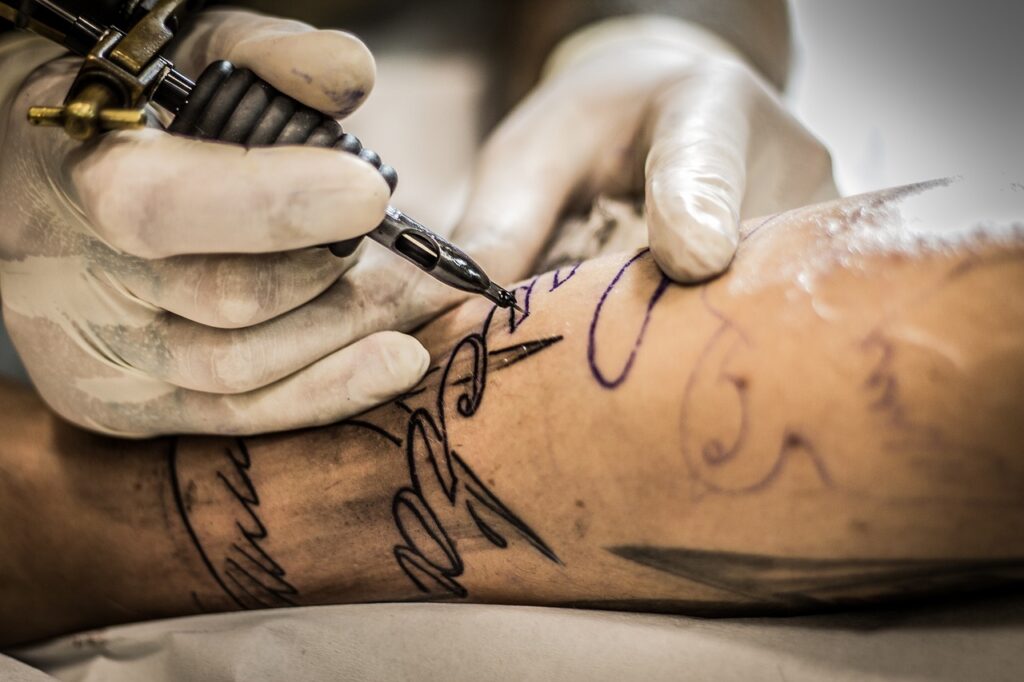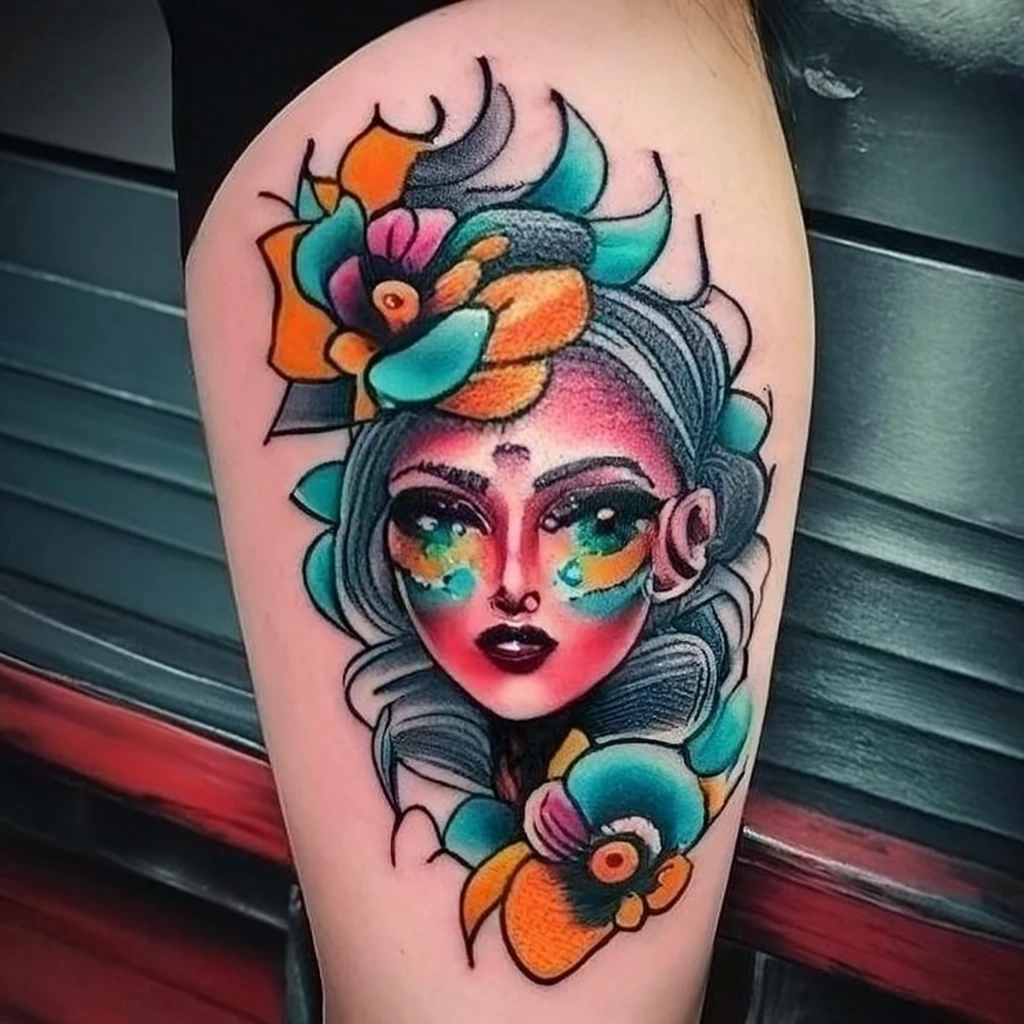Hey there, tattoo enthusiasts and curious readers! Have you ever wondered, “Are tattoos permanent?” Well, you’re not alone! Tattoos have become a widespread form of self-expression and art, but understanding their permanence is crucial before taking the plunge. Whether you’re considering getting inked or already sporting a masterpiece, stick around to discover the ins and outs of tattoo longevity. From the nitty-gritty of tattoo aftercare to exploring removal options and more, we’ve got you covered.

What Makes Tattoos Permanent?
Ever wondered if tattoos are truly forever? Let’s clear that up! Tattoos are indeed intended to be long-lasting works of art, and the secret lies in the process. When you get inked, a skilled tattoo artist injects ink into the deeper layer of your skin, known as the dermis. This ensures that the design stays put and doesn’t wash away like temporary tattoos. So, rest assured that your tattoo is here to stay!
Not All Tattoos Are Created Equal
Now, here’s the thing – while tattoos are meant to be long-lasting, they won’t all age the same way. Several factors can influence their longevity. Factors like ink quality, your skin type, and how well you care for your tattoo play a significant role in determining its lifespan. Taking proper care and using high-quality ink can make a noticeable difference in how long your tattoo remains vibrant and sharp. It’s essential to follow your tattoo artist’s aftercare instructions to ensure your tattoo ages gracefully.
The Myth of Tattoo Permanence
Alright, let’s debunk a common myth – the idea of tattoo permanence. While tattoos are meant to be long-lasting, they won’t stay exactly the same forever. Over time, tattoos can naturally fade or blur due to various factors, including sun exposure, aging, and the type of ink used. But don’t worry, this evolution is all part of the tattoo’s unique charm. Each tattoo tells a story, and its changes make it even more special, like a living piece of art!
How Long Do Tattoos Last?
So, you’ve got your tattoo, and it looks amazing! But how long can you expect it to stay that way? Let’s delve into the typical lifespan of tattoos. On average, a well-maintained tattoo can retain its vibrancy and sharpness for several years. However, it’s essential to understand that tattoos may age differently from person to person. Factors such as ink quality, skin type, and aftercare practices can all play a role in how long your tattoo looks its best.

Factors Affecting Tattoo Longevity
While tattoos are meant to be long-lasting, some elements can influence their lifespan. One of the most significant factors is sun exposure. Prolonged exposure to the sun’s harmful UV rays can lead to fading and dullness of your tattoo over time. To protect your tattoo, make sure to apply sunscreen regularly and consider covering it with clothing when under the sun.
Additionally, the type of ink used can also impact the longevity of your tattoo. Some ink colors may fade faster than others, so discussing color options with your tattoo artist can help you make an informed decision.
Embracing the Changes
As the years pass, it’s natural for tattoos to evolve. Colors may soften, and fine details might blur slightly. But don’t worry – these changes are part of the tattoo’s unique journey. Embrace the evolution of your tattoo, as it tells your story and becomes an integral part of your identity. Each stage of your tattoo’s life adds character and meaning to the overall design, making it a cherished and treasured piece of body art.
Can Tattoos be Completely Removed?

While tattoos are designed to be permanent, circumstances might change, and you may find yourself considering tattoo removal. So, let’s explore your options.
Tattoo Removal Methods
If you’re looking to bid farewell to your tattoo, there are several removal methods available. One popular option is laser tattoo removal, where powerful laser beams break down the tattoo ink into smaller particles, allowing the body to naturally eliminate them.
Dermabrasion is another method that involves sanding down the skin’s surface to remove the tattoo, while surgical excision entails physically cutting out the tattooed area. However, it’s important to note that complete removal without any traces can be challenging, and scarring is a possible outcome with certain removal techniques.
The Importance of Research and Consultation
If you’re considering tattoo removal, thorough research is vital. Look into different methods, their potential side effects, and the experience of qualified practitioners. Consulting with a professional tattoo removal specialist will help you understand the best approach for your unique situation.
Best Practices for Tattoo Aftercare
Congratulations on your new tattoo! Now, let’s ensure it stays vibrant and beautiful for years to come.
Follow Your Tattoo Artist’s Aftercare Instructions
After getting inked, your tattoo artist will provide specific aftercare instructions to promote proper healing. These instructions often include keeping the tattoo clean, applying a recommended ointment, and avoiding certain activities that could disrupt the healing process. Following these guidelines diligently will aid in the healing process and contribute to the long-lasting brilliance of your tattoo.
Shield Your Tattoo from the Sun.
We can’t stress this enough – protecting your tattoo from the sun is essential! Ultraviolet (UV) rays can cause ink to fade and the skin to damage over time. Use a high SPF sunscreen to shield your tattoo whenever you’re exposed to the sun. Additionally, consider wearing protective clothing to minimize sun exposure on your tattooed area.
Moisturize Regularly
Keeping your tattoo well-hydrated is crucial for preserving its color and sharpness. Apply a fragrance-free, gentle moisturizer to the tattooed area regularly, especially after washing or swimming. Well-moisturized skin helps maintain the tattoo’s overall appearance and prevents dryness that could lead to cracking or fading.
Schedule Touch-ups When Needed.
Over time, tattoos may experience subtle fading or slight changes. If you notice any areas that need improvement, don’t hesitate to reach out to your tattoo artist for a touch-up. These minor adjustments can restore your tattoo’s vibrancy and ensure it looks as good as new.
Bringing Life Back to Faded Tattoos
As time passes, it’s not uncommon for tattoos to undergo some changes. But don’t worry – if your once-vibrant tattoo has faded, there are options to restore its brilliance.
Restoring Faded Tattoos: The Process.
Tattoo restoration involves revitalizing a faded design to bring back its original charm. Skilled tattoo artists can use various techniques to enhance colors, sharpen lines, and rejuvenate the overall appearance. However, it’s important to note that not all faded tattoos can be fully restored, and the results may vary based on the extent of fading and the tattoo’s condition.
Considering a Touch-up or Cover-up.
If restoration isn’t feasible, you might consider a touch-up or a cover-up. A touch-up involves enhancing specific areas of your tattoo to bring back its vibrancy, while a cover-up entails designing a new tattoo over the existing one. Skilled tattoo artists can work their magic to create a fresh, innovative design that incorporates and revitalizes the original tattoo.
Tattoo and Cover-up Myths Revealed
Myth #1 – Complete Tattoo Removal without Traces.
You might have heard that tattoos can be completely removed without leaving any traces behind. While modern tattoo removal methods like laser treatments have come a long way, achieving complete removal without a hint of the tattoo is often unrealistic. Factors like ink color, depth, and individual skin reactions can impact the outcome. It’s essential to approach tattoo removal with realistic expectations.
Myth #2 – Quick and Painless Removal
Tattoo removal procedures are often portrayed as quick and painless, but that’s not always the case. While advancements in technology have made removal more efficient, it can still be a gradual process. Depending on factors like tattoo size, ink type, and individual pain tolerance, some discomfort is to be expected. However, numbing creams and other measures are available to help manage any discomfort during the process.
Myth #3 – Tattoo Modification Erases the Original
If you’re considering modifying your tattoo, you might fear losing the essence of the original design. Fear not! Talented tattoo artists can skillfully incorporate new elements while preserving the essence of your existing tattoo. Whether you want to add more details or change the theme altogether, a thoughtful modification can breathe new life into your body art.
Final Thoughts
Now that we’ve explored the fascinating world of tattoo permanence, you’re equipped with valuable insights to make informed decisions about your body art. Remember, tattoos are meant to be long-lasting expressions of your individuality and creativity. Embrace the natural evolution of your tattoo as it tells your unique story over time.
Interested in learning about Memento Mori tattoos and their meaning. Check out our post here.
Not sure where to place your tattoo? Read out post on where to place your tattoo here.
Frequently Asked Questions
Do tattoos fade over time?
Yes, tattoos can fade over time due to factors like sun exposure, aging, and the type of ink used. Proper aftercare and protecting your tattoo from the sun can help maintain its vibrancy.
Can tattoos be completely removed without any traces?
While tattoo removal methods like laser treatments have advanced, completely removing tattoos without any traces is often challenging. Factors like ink color, depth, and individual skin reactions can impact the outcome.
How long is the typical lifespan of tattoos before they start to fade?
On average, well-maintained tattoos can retain their vibrancy for several years before showing signs of fading. However, this can vary based on factors like ink quality, skin type, and aftercare practices.
Is it possible to modify or cover up tattoos?
A: Yes, tattoos can be modified or covered up to refresh their appearance. Skilled tattoo artists can enhance specific areas with touch-ups or design new tattoos to cover the existing ones.
Is tattoo removal a quick and painless process?
While advancements in tattoo removal technology have improved the process, it is not always quick and painless. The experience can vary depending on factors like tattoo size, ink type, and individual pain tolerance.
